Loneliness Annual Report January 2020
Published 20 January 2020
Applies to England
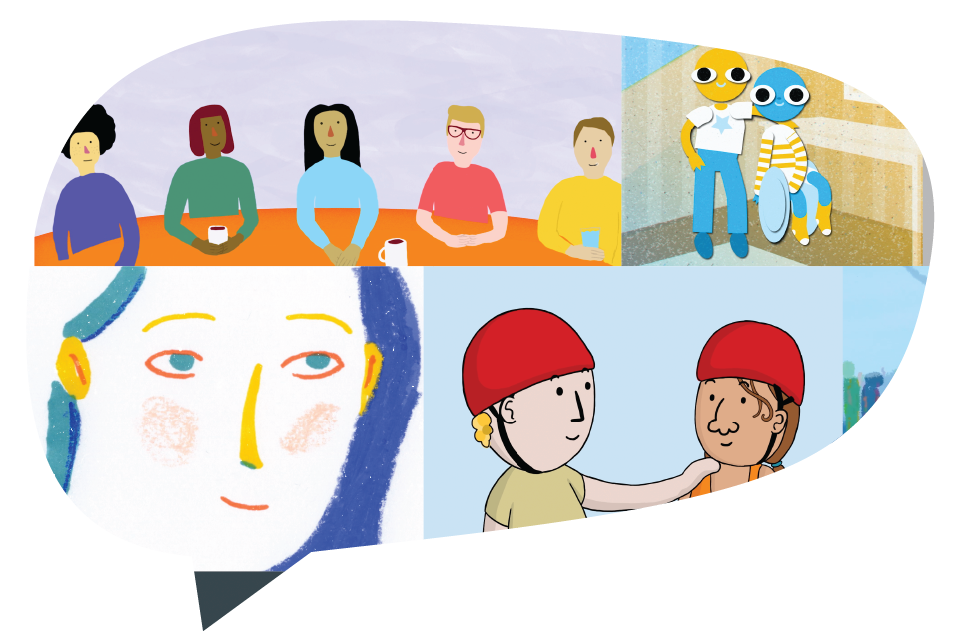
Cover photo of Illustrated elements of loneliness made into a collage and shaped as a speech bubble.
1. Ministerial Foreword from the Secretary of State for Digital, Culture, Media and Sport and the Minister for Civil Society

The Right Honourable Nicky Morgan and Baroness Diana Barran MBE
Everyone will know someone who has been lonely. The vast majority of us will feel this way at some point in our lives. Since the world’s first minister responsible for tackling loneliness was appointed by the government in January 2018, people from across the country and the world have come forward to share their experiences and knowledge of loneliness, and to learn from our approach.
There has been strong support for the direction of travel set out in ‘A Connected Society: A strategy for tackling loneliness - laying the foundations for change’ published in late 2018. We have been struck by the amount of correspondence which has come through to us on loneliness. With somewhere between 6% and 18% of the population often feeling lonely, this level of interest is not surprising. We know the negative impact that loneliness can have on a whole host of aspects of our lives, including our health, wellbeing, productivity, and self-esteem. Often feeling lonely has been linked to early deaths and an increased risk of coronary heart disease, stroke, depression, cognitive decline and Alzheimer’s. We believe that government has a part to play in reducing loneliness.
Government is doing this in three ways:
- reducing stigma by building the national conversation on loneliness, so that people feel able to talk about loneliness and reach out for help
- driving a lasting shift so that relationships and loneliness are considered in government policy-making, both so that government action has a direct impact, but more importantly to support and amplify the impact of civil society organisations who are connecting people in their communities
- playing our part in improving the evidence base on loneliness, making a compelling case for action, and ensuring everyone has the information they need to make informed decisions on what to do to tackle loneliness
Civil society is key to reducing loneliness - from neighbours taking the time for a kind word, to small groups run by volunteers, to larger charities with expertise supporting people through challenging times.
We want to celebrate and better support organisations who work tirelessly to help people build stronger connections and develop their sense of belonging. We recently marked the one year anniversary of the loneliness strategy by announcing an additional £2 million of grant funding to do just this.
We know how important the public sector, health systems and local government are in tackling loneliness, and commend organisations supporting social connections in their communities and among their employees. A whole society approach is essential.
Our department does not act alone, we have taken a cross-government approach to recognise that no one department or Minister holds all the levers needed to tackle loneliness. Beyond that, we know that loneliness can only be effectively acted on in partnership with other sectors. We are truly grateful to the thousands of individuals and organisations that are making a difference everyday.
2. Introduction

Introduction Speech Bubble Graphic
In January 2018, in response to the Jo Cox Commission report on loneliness, the government set out its first steps to tackle loneliness.
Over the course of 2018, the government appointed the world’s first minister to lead work on tackling loneliness, launched the £11.5 million Building Connections Fund in partnership with The National Lottery Community Fund and the Co-op Foundation, developed a recommended measurement package, started to improve the evidence base on loneliness and published the world’s first government loneliness strategy, ‘A Connected Society: A strategy for tackling loneliness - laying the foundations for change’.
This strategy marked a shift in the way government saw and acted on loneliness. It set out a clear vision for this country to be a place where we can all have strong social relationships. Where families, friends and communities support each other, especially at vulnerable points where people are at greater risk of loneliness. Where institutions, businesses and organisations value the human element in their interactions with people. And where loneliness is recognised and acted on without stigma or shame so that we all look out for one another.
At the start of a new decade, government’s goal remains to significantly reduce the number of lonely people over the next ten years. Doing so will require long-term action from government, business and civil society and a change in public attitudes. Everyone has a role to play in building a national conversation on loneliness, improving the evidence base and considering relationships and loneliness across our decision making.
This report tells the story of what has been achieved since the publication of the loneliness strategy, and sets the government’s direction of travel on the loneliness journey.
3. Progress

Progress Speech Bubble Graphic
3.1 Strategy Commitments
Since the strategy’s launch in 2018, departments across government have been working to deliver on its 60 commitments.
This includes:
-
frontline workers across the public sector are being helped to recognise and act on loneliness, including: social workers, 19,000 work coaches and other Jobcentre claimant-facing staff, NHS England funded social prescribing link workers and staff working in over half of England’s Mobility Centres. The Local Government Association and the National Association of Local Councils have also developed a comprehensive guide - ‘Reaching Out’ - on tackling loneliness for local authorities
-
the expansion and improvement of social prescribing - this is supporting the recruitment of 1,000 additional social prescribing link workers within primary care networks by April 2021. This will help to ensure more people are connected with the care and support they need when experiencing loneliness no matter where they live
-
with over 9.84 million global impressions, over 26,500 site visits and more than 320 organisations having downloaded its toolkit since its launch in June 2019, the government’s ‘Let’s Talk Loneliness’ campaign has gained widespread support from across sectors, helping to highlight how loneliness is a normal, human emotion that should be talked about. Public Health England has also threaded material on social connections and loneliness throughout the ‘Every Mind Matters’ campaign, launched in October 2019
-
several pilots to help us learn more about loneliness and support people across society and at different life transition points, have been completed or are underway. These include: open data pilots exploring how to better capture and share information about local support and activities tackling loneliness; trialling an initiative between Royal Mail’s postal workers and local authorities to identify older isolated people at risk of loneliness; and testing and developing new ways to encourage older people to take part in voluntary and community activities
-
a network for employers committed to tackling loneliness, chaired by the Campaign to End Loneliness and comprised of more than thirty organisations that employ over 900,000 people, has met throughout the year to explore how to support employees to overcome loneliness. The best practice they have identified will be published in early 2020 to support organisations across the country do more to help their employees
-
the statutory guidance for the new subjects of relationships education, relationships and sex education (RSE) and health education, now states primary and secondary school children should be taught about loneliness from September 2020
-
cross-government work to tackle loneliness, overseen by a Ministerial implementation group, has continued to embed the consideration of loneliness across government policy-making by raising awareness of loneliness amongst policy-makers through events, policy schools and more. The refresh of the Family Test guidance will also prompt policy-makers to consider loneliness
4. Evidence and Insights

Evidence and Insights Speech Bubble Graphic
Since the loneliness strategy was launched, the government has made significant contributions to improve the understanding of loneliness:
-
the Office for National Statistics (ONS) has published a package of comprehensive information on measuring loneliness and methodological guidance on the use of the measurement tools. The next steps are for the ONS to review the measures, helping to ensure they are used across the Government Statistical Service
-
the loneliness measures have been approved for inclusion in more government surveys, including the National Travel Survey, the English Housing Survey and the Health Survey for England
-
for the first time, the Public Health Outcomes Framework will include the loneliness measure. Once data becomes available, local authorities will be able to benchmark their loneliness outcomes against other local areas
-
government has explored what its contribution should be on improving the evidence base and is now committing to fund an organisation (or partnership of organisations) to lead on loneliness learning throughout 2020/21, with the possibility of extension into future years, as we recognise the importance of long-term resourcing for this role
4.1 Funding for Community Projects Connecting People
The £11.5m Building Connections Fund is a partnership between government[footnote 1], The National Lottery Community Fund and the Co-op Foundation. In December 2018, grant awards ranging between £30,000 to £100,000 were made to 126 organisations across England, including 22 organisations working specifically with young people. The first learning from the evaluation of the fund will be available in mid-2020.
Government has also provided other sources of grant-funding this year to tackle loneliness. For example, it partnered with the Co-op Foundation on two grant funds around community spaces, totalling £2.6 million, to help improve community spaces where people can connect and co-operate.
In October 2019, an additional £2 million of government funding providing grants for frontline grassroots organisations that bring people together was announced. This investment will be delivered in partnership with The National Lottery Community Fund, which is contributing financially to increase the funding available to up to £4 million. Further details will be released shortly.
5. Going Further

Going Further Speech Bubble Graphic
The strategy was the beginning rather than the full extent of the government’s commitment on loneliness, and work continues to look at building on the successes and planning for the longer term.
Three areas of focus for this year have been developed in collaboration across government departments and with external stakeholders, including the charity and business sectors:
- the need for more information and communication about loneliness and the activities which are available to reduce it
- the need for further policies targeted at tackling children and young people’s loneliness - young people report struggling with loneliness more than any other group, but targeted interventions and policies are currently relatively sparse
- the need to tackle loneliness through place - strengthening community infrastructure and assets, and growing people’s sense of belonging
Government is now exploring taking action in these three areas with further details to be announced later this year.
The government is committed to building on the world-leading steps taken so far in England to tackle loneliness. With thanks to all those individuals and organisations working on loneliness. It is only in partnership with civil society and all sectors of the community that we can continue to drive forward action on loneliness.
The Minister for Civil Society will continue to lead this work and to chair the cross-government Ministerial Group on Tackling Loneliness, ensuring government commitments are delivered and built on so that far fewer people feel alone and disconnected over the next decade.
6. Case Studies

Case Studies Speech Bubble Graphic
6.1 Denby Dale Centre
West Yorkshire
The Denby Dale Centre is an independent charity operating in Kirklees, West Yorkshire. It aims to reduce loneliness and improve quality of life through a series of projects, including community transport services. While the membership is open to everyone in the area, the main service users are older people.
Through the Building Connections Fund[footnote 2] project, the Denby Dale Centre has been able to expand the Volunteer Car Service from a rural service to a service for the whole area. One of the service users, Carly, a 31-year-old blind woman from Highburton, was experiencing low self-confidence and felt anxious about being out and about. Carly started using the service to go to what she called “blind club”, but only wanted transport to the local mainline railway station seven miles away, as the club met in the nearest city. After a few months of her weekly trip in the car service Carly asked for a trip to a small branch line station in the opposite direction – she said she was heading to Leicester which was quite a surprise. After a few trips to Leicester, she revealed that her blind club was a “Blind Cricket” group and that she had developed her skills to a point where she had been selected to play cricket for the county team and was attending Leicester as she was under selection to play for the country. The Volunteer Car Service has helped Carly out of her isolation, loneliness and low confidence into a very capable and now international sportswoman.
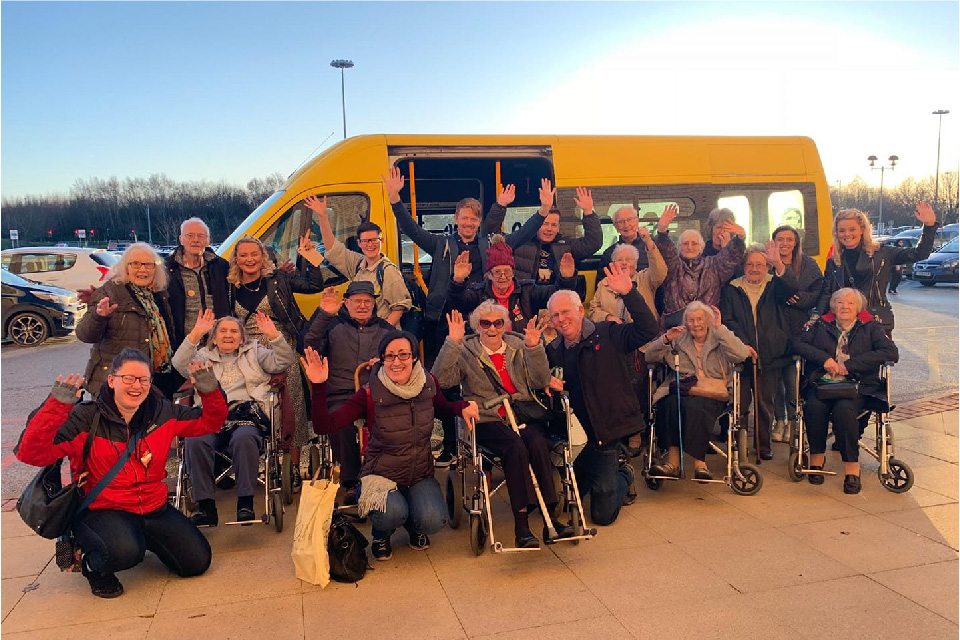
Photo of a group of people standing outside a yellow minibus purchased by the Denby Dale Centre as part of their volunteer car service.
Chief Officer, Paul Jones, said about the funding: “The Building Connections Fund is making a massive difference for individual people living in Kirklees. The Volunteer Car Service is helping individuals overcome personal transport barriers and attend groups or appointments that had previously been impossible to attend. The charity has also purchased a minibus to help support the growing needs in the area for transport, with the amount of passenger trips increasing by 50% since last year. The amount of groups who use our fleet has also increased by 30% since last year, with a third of the users being under 18 years.”
6.2 Plunkett Foundation
Talking Shop - a community business in Oxfordshire
Combatting loneliness was a key motivator in the beginning for Talking Shop in Sandford-on-Thames, Oxfordshire. Over the years the village lost its school, pub and post office. By 2011 there was a growing desire for a new social hub as much as there was for a place to buy a pint of milk and a newspaper. What started as a weekly market run by local volunteers had by 2016 become a community café, shop and local hub. There are now over 120 volunteers bringing together a mix of people - including retirees, young and older people rebuilding their lives after mental ill health, and newcomers to the village. Today, Talking Shop’s array of facilities and services directly aim to reduce social isolation and loneliness.
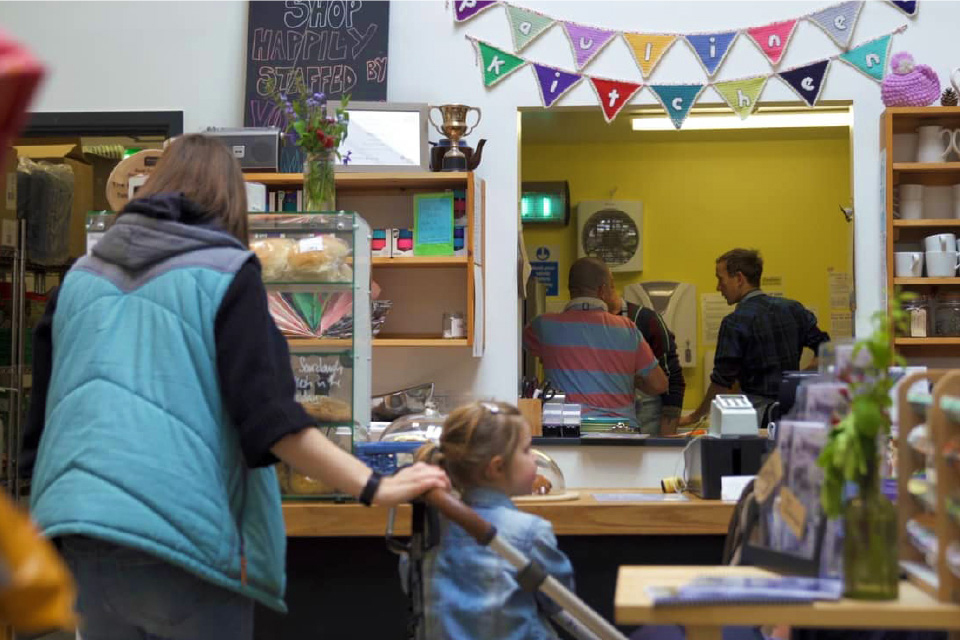
Photo of a woman and her child in the Talking Shop in Sandford-on-Thames, Oxfordshire
Derek, a Sandford resident, said: “At the beginning of 2016 at the age of 92 I came to live in Sandford. An age when resettling is not as easy as it once was, combined with other restrictions, such as not having a car. Fortunately for me, Talking Shop was developing and was within easy walking distance. So I found I was welcomed by people at the shop and accepted in spite of increasing deafness. After my wife was diagnosed with dementia I became increasingly involved with her care. But now that has decreased because of my age and deafness. The gap is being filled, to a large extent, by Talking Shop activities.”
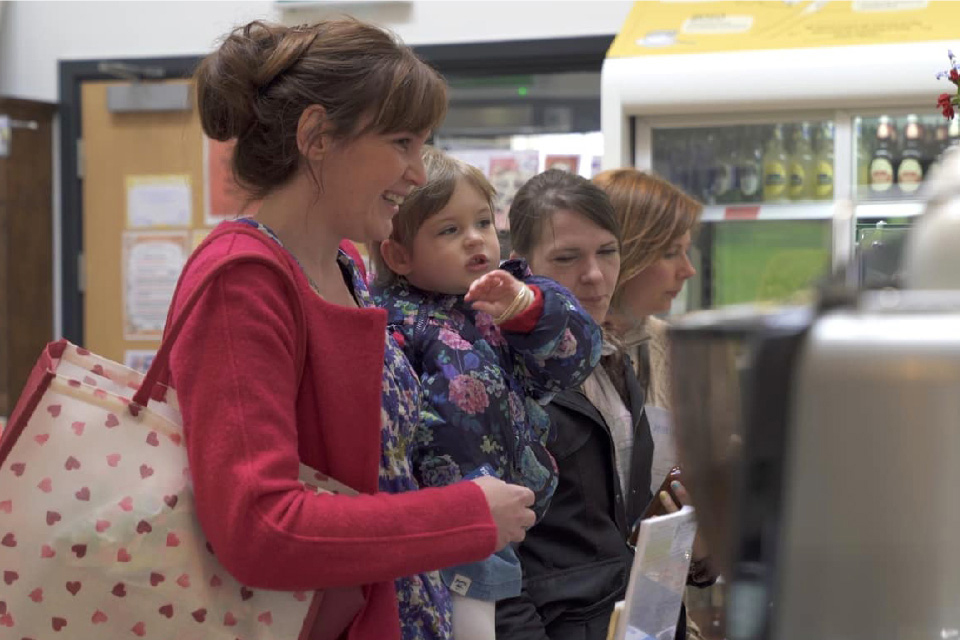
Photo of a woman holding a young child, about to purchase something from The Talking Shop
The Plunkett Foundation helps rural communities tackle the issues they face through promoting and supporting community business. Community businesses are owned and run by the community and others, for the community. They include shops, pubs, woodlands and much more. Plunkett has supported Talking Shop throughout their journey crowning them winners at Plunkett’s 2018 Rural Community Ownership Awards for their work on tackling loneliness and isolation.
6.3 Boxing Futures
Peterborough
“It’s helped me find a place where I feel safe. I used to be really lonely, I had no routine, and my mental health wasn’t great. I feel like I have a family now,” Saffron, 20.
Saffron is a member of Sisters Through Boxing, a Peterborough-based programme that uses boxing to build the health and wellbeing of local women and fight their feelings of loneliness.
The programme is run by Boxing Futures and is part-funded with a £77,000 grant from the Building Connections Fund youth strand.

Photo of Saffron and Chloe boxing with Boxing Futures
Sisters Through Boxing was co-designed with local young women through a three-month outreach programme and focus groups. Participants used these sessions to choose what activities they should do, how often they should meet and what they wanted to achieve.
The programme was then launched in April 2019 for 16 to 25-year-olds. It runs weekly with boxercise sessions held in a real boxing ring and group chats where participants are encouraged to talk about issues that affect them, such as body image, sexual health and loneliness.
Saffron said: “Boxing Futures [has] helped me in terms of increasing my confidence, and it’s made a huge difference to my life.”
Fellow Sisters Through Boxing member, Kitty, added: “It’s like our own little support system where we just come together and talk about what our week’s been like, anything that’s going on in our lives.”
6.4 Association of Convenience Stores
St Tudy Community Shop
St Tudy Shop and Post Office was established in 2011 to provide goods and services to the small rural village of St Tudy, with a population of about 800. The community-owned shop’s immediate aim was to retain a core grocery offer in the village following the closure of a local shop. This aim has since developed into providing a community hub, a place where people can come together, thus reducing isolation and strengthening community cohesion.
The shop serves customers of all backgrounds and provides a range of groceries as well as post office services, prescription collection services, community noticeboards and even home grocery delivery to isolated people unable to get to the shop. The shop opened a café and library facilities in early 2018, specifically aimed at encouraging social connection opportunities and providing a place for isolated people of all ages and demographics to visit in the village.
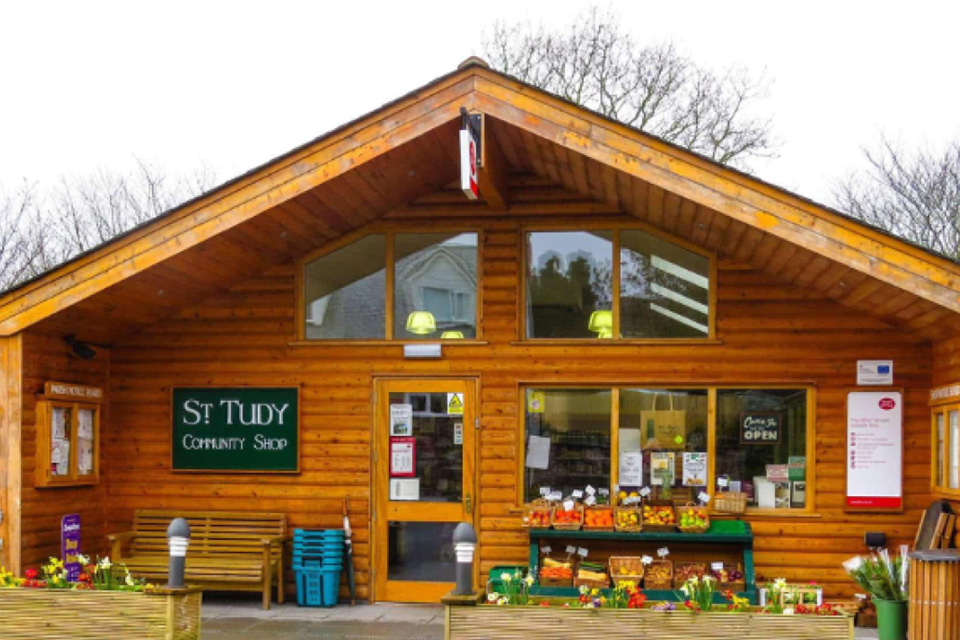
Photo of the St Tudy Community Shop
The shop supports customers experiencing life changes putting them at risk of loneliness. For example, a local resident, grieving from the loss of her husband, now works in the shop just to leave home and connect with others in the community. She has been heavily involved with the café expansion, encouraging other people to take advantage of the shop’s social environment. Another man on the autistic spectrum who virtually never left home now works in the shop, which has developed his confidence to slowly build relationships with his fellow workers.
The shop manager is aware of the routine of regular customers and keeps an eye on the frailer members of the community, particularly those who live alone whose only social interaction may be a visit to the shop. The shop also provides financial support to other community hubs in the area, including the Village Hall and Over Sixties Club.
The shop circulates a welcome pack to new people moving into the village, welcoming them to the shop as a customer and encouraging them to volunteer to integrate with their new local community. The shop also conducts an annual survey to gain feedback from local people on the services offered, making sure the shop caters for local community needs.
6.5 Faith Action
Community Resources for Change - Dagenham
Community Resources for Change (CRC) is a grassroots charity gathering volunteers to improve the health and wellbeing of the residents of Barking and Dagenham. Founded in a church setting, the charity now operates as a series of ‘connecting spaces’ including a coffee shop and community drop-in centre. It seeks to develop social connections and friendships to address loneliness and prevent crisis.
Beneficiaries come from local neighbourhoods, with two thirds from BAME backgrounds, and typically face challenges relating to loneliness, low confidence and poor mental health, as well as poverty, language and learning barriers. The opportunity to volunteer and give back is key to providing a sense of belonging and purpose to the people that attend. Evaluations carried out by the CRC team regularly report reduced feelings of isolation among beneficiaries.
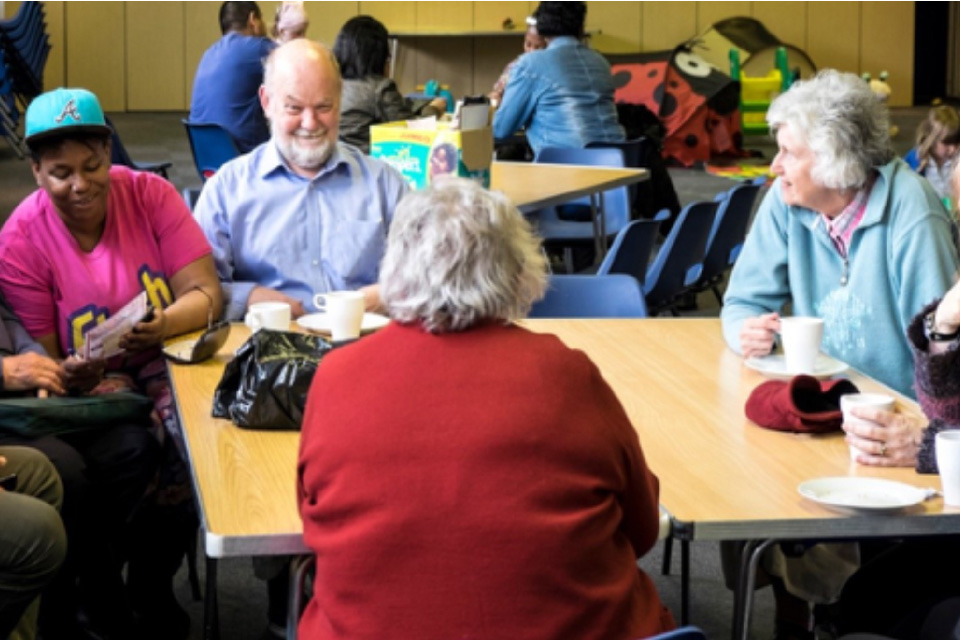
Photo of a group of people sitting around a table, having tea and a chat
Since 2008 CRC has been working with a psychotherapist in the Perinatal Parent Infant Mental Health Service at a local hospital. This psychotherapist was running a support group for women referred to the service and saw an opportunity to partner with CRC, which she felt could provide friendship, community and peer support that these women needed. She now makes regular introductions to CRC for women she feels would benefit from the community and the sense of belonging it provides.
‘Tinaye’ was one such beneficiary. “When we met Tinaye,” explains one of the team from CRC, “she was in the process of being discharged. She had experienced post-natal depression and domestic violence, was homeless and very isolated. Years later, she is now a Sister on a busy Accident and Emergency ward and is a volunteer with the charity, supporting other vulnerable women.”
‘Lesley’ is a 53-year-old lady with chronic mental health issues. She has no close family and lives alone in warden-controlled housing close to the drop-in centre and coffee shop. She says she feels more comfortable and peaceful at the centre, and now has new friends, one of whom recently took her shopping at a nearby town centre. She was able to celebrate her birthday last year with a cake, candles and gifts, which was a first time experience for her.
7. ANNEX: Loneliness Strategy Commitments
| Commitment | Description | |
|---|---|---|
| 1 | Government’s use of the ONS recommended measurement package | Government has committed to using the recommended measurement package as its standard way of measuring loneliness; it will now be collected as part of the Health Survey for England, Active Lives, Taking Part, the English Housing Survey, Families Continuous Attitude Survey, the Community Life Survey and the National Travel Survey. |
| 2 | Continuing evidence building | Government held a series of workshops in spring 2019 to discuss how it can contribute to improving the understanding of loneliness. |
| 3 | By 2023, local health & care systems to provide Social Prescribing Connector Schemes | Funding has been made available for the creation of over 1000 additional social prescribing link worker roles within primary care networks to be in place by April 2021. |
| 4 | Publish a Common Outcomes Framework for social prescribing | In January 2019 NHS England published a Common Outcomes Framework for social prescribing, as part of the Social Prescribing Summary Guide. |
| 5 | Mapping all social prescribing connector schemes across England | NHS England and NHS Improvement has worked with local partners and associates to create a national database of local social prescribing connector schemes across England |
| 6 | Best practice guide to social prescribing | Three publications have been created by NHS England and NHS Improvement in 2019: 1) Social Prescribing Summary Guide, 2) Universal Personalised Care and 3) Primary Care Network Reference Guide. All three publications highlight the role social prescribing can play in tackling loneliness. |
| 7 | Online social prescribing platform | NHS England and NHS Improvement has established a free online community, which now has over 1,600 members actively involved in developing social prescribing. |
| 8 | Piloting new accredited learning programmes for social prescribing link workers | Two learning programmes have been established within 2019: a Level 3 Social Prescribing Certificate and a delivered modular training for social prescribing link workers.There is also a regular fortnightly webinar programme for social prescribing link workers. An online e-learning programme is currently in development and the introductory module made available. |
| 9 | Establishing regional social prescribing steering groups | Regional Social Prescribing Facilitators have worked with partners across each English region to set up social prescribing networks. These networks coordinate support for social prescribing and share best practice with a focus on tackling loneliness. |
| 10 | Assess how a variety of organisations and services currently refer individuals into social prescribing schemes | The assessment looked across a variety of public agencies such as the NHS, Jobcentre Plus, Councils and pharmacies, as well as the services provided by social workers. It highlighted that effective local partnerships between health, local authorities and other agencies working with the voluntary and community sector, continue to be developed. This is helping staff to make and receive referrals from their partners, enabling people to get the right support for both their emotional and physical needs. These referrals remain widespread and are happening on a daily basis in local areas. |
| 11 | Trial an innovative digital solution ‘Safe and Connected’ | The Home Office worked with Royal Mail and local authorities to trial an innovative scheme which involved postal workers calling on participants aged 65 and older twice a week and signposted those who reported feeling lonely to appropriate support. The scheme had positive results and trial partners are exploring ways to scale-up the service. |
| 12 | Include loneliness measure in consultation on revising the Public Health Outcomes Framework | The Public Health Outcomes Framework has been updated and will now include the loneliness measure. |
| 13 | Enhance ‘Tell us Once’ initiative | The Department for Work and Pensions has revised the letter that is issued to bereaved citizens who use the ‘Tell Us Once’ service to notify the government of a bereavement so that it now includes suggestions for sources of support for loneliness. |
| 14 | Mobility Centre pilots | Seven of the thirteen Mobility Centres in England are trialling an extension to their services – known as Mobility Centre “Hubs” – where individuals who cannot or can no longer drive are given support to access public transport. As part of this trial Mobility Centre staff will seek to identify and act on signs of loneliness amongst their clients. |
| 15 | National Trading Standards Scam Marshal scheme | The Home Office has commissioned a scheme which aims to improve the resilience of lonely or socially isolated older adults by helping them to fight back against fraud, scams and financial abuse. The scheme was successfully rolled out to over 1,000 new participants in 2019. |
| 16 | Open Data pilots | In partnership with the Local Government Association and digital experts, the Department for Digital, Culture, Media and Sport and the Ministry of Housing, Communities and Local Government are investigating ways of collecting information about what activities and services are locally available to address loneliness. This includes exploring how stakeholders from a range of sectors can be motivated to capture this data and keep it up to date. The pilots are in Elmbridge District Council, Hull City Council and Blackburn with Darwen Council and are already attracting attention across other English councils. Data and learning will be published by the end of March 2020. |
| 17 | Sharing Local Authority’s good practice | The Local Government Association and the National Association of Local Councils have developed a comprehensive guide called ‘Reaching Out’, which outlines how principal and local councils can create the right structures and conditions locally to support those affected by, or at risk of, loneliness. The guide is available both online and in hard copy. |
| 18 | Employer network on tackling loneliness | The Employer Leadership Group, chaired by the Campaign to End Loneliness and supported by the Department for Business, Energy and Industrial Strategy, was established in November 2018. The group is made up of a number of businesses, business representatives and third sector organisations. The group works to champion the employer pledge (committing employers to support their employee’s social wellbeing and tackle loneliness in the workplace) and share best practice. The group has met three times. Businesses continue to join the network and to act on tackling loneliness both for their employees and the wider community. A good practice guide will be published in spring 2020. |
| 19 | Capture business good practice in communities | Part of a good practice guide which is being developed (no. 18), will highlight examples of how employers have taken action to promote connection and reduce loneliness among their employees, as well as the wider community. |
| 20 | Sharing good practice from Jobcentres and providing training | Jobcentre Plus has rolled out mental health training which includes a specific section on social connection, isolation and loneliness to help staff spot the signs of loneliness in claimants and sign-post them to local specialist support. The training is now being rolled out to all job roles which have interactions with a claimant. |
| 21 | Improve knowledge sharing among social workers | Following a review of evidence and good practice in identifying and tackling loneliness in a social work context (completed in June 2019), the Department of Health and Social Care has been working with the Adult Principal Social Worker Network to highlight examples of effective approaches and interventions to reduce loneliness to include in a report for social workers. The report ‘Evidence Scope: Loneliness and Social Work” will be published shortly after this report. |
| 22 | Community Spaces Funding | Government has partnered with the Co-op Foundation to allocate £1.8 million to community spaces projects. This was done through: an initial £1 million of government funding to support 112 short term projects to tackle youth loneliness through co-design, with a focus on under-used community spaces; followed by a £1.6 million Space to Connect Fund (funded jointly by government and Co-op Foundation) to help improve community spaces where people can connect and co-operate. |
| 23 | Guidance for schools on use of their premises | The Department for Education has developed guidance for schools to encourage them to raise commercial revenue by allowing groups to use school premises, which includes a section on considering loneliness. We hope to publish this in 2020. |
| 24 | Collect data on school using their premises | Data is currently being collected on how many schools are already being used as community spaces. The Department for Education has added a question to the Consistent Financial Reporting (CFR) framework to assess how far schools are already being used as community spaces. Findings from 2019/20 will be published in 2020/21. |
| 25 | Support use of underused railway property | The Department for Transport has run training sessions on volunteering and social inclusion, presenting models for how community rail can engage wider groups in station-based volunteering in order to benefit diverse groups and overcome exclusion. |
| 26 | Good practice on using Department for Work and Pensions space | There is a wide range of ongoing local initiatives in Jobcentres and on local premises which aim to bring together claimants from different backgrounds in order to build social connections with each other and the community. |
| 27 | Businesses using their space for communities | As part of the work to identify good practice for employers tackling loneliness in their communities, the Department for Business, Energy and Industrial Strategy and the Campaign to End Loneliness have identified a number of organisations and case studies who allow groups to use their spaces. This will be published alongside their other outputs in 2020. |
| 28 | ACRE targeting loneliness using Department for Environment, Food and Rural Affairs funding | The Action with Communities in Rural England (ACRE) network consists of 38 rural councils across England and is using the Department for Environment, Food and Rural Affairs funding to address loneliness across its strategic priority areas; this is alongside £3 million of funding to renovate village halls. |
| 29 | Rural roundtable | Lord Gardiner has held two roundtables to discuss how best to address loneliness in rural areas, with attendees from the ACRE network, the NFU, Church of England, and the Farming Community Network. The Department for Environment, Food and Rural Affairs will continue to hold roundtables to develop work on rural loneliness. |
| 30 | Funding for Community Transport drivers’ qualifications | The Department for Transport is funding the Community Transport Association to enable the existing Minibus Driver Awareness Scheme (MiDAS) training to be recognised as part of the qualification for professional coach and bus drivers. |
| 31 | Partnerships with transport providers | The government has been working in partnership with the transport sector to highlight the issue of loneliness and support the sector to take action, and bus companies have been trialling a range of initiatives over this year to support social interactions on local transport. |
| 32 | The Future of Urban Mobility Strategy | The Future of Urban Mobility Strategy was published in March 2019 in which the government set out a proactive approach to address disparities in access to travel and to ensure emerging innovative mobility services and technologies are made accessible and inclusive by design. |
| 33 | Research into the impact of community-led housing and co-housing solutions | The Ministry of Housing, Communities and Local Government has allocated £125,000 funding for research into housing solutions to tackle loneliness and has begun a research pilot to: evaluate the value for money and impact of housing interventions on loneliness; understand the impact of community-led housing and co-housing on reducing loneliness across all ages; and explore best practice in housing schemes that promote social cohesion. The final report will be delivered by July 2020. |
| 34 | Run a series of industry events, conferences and seminars and publish case studies and evidence | At the Ministry of Housing, Communities and Local Government’s national design quality conference in Birmingham in February 2019, the subject of tackling loneliness was a guiding theme and involved a showcase of good-practice examples in housing design which have facilitated community engagement and social interaction. These case studies were also displayed at the Housing 2019 conference in Manchester in June. |
| 35 | Loneliness as a measure of design quality and community cohesion is included in garden communities assessment and support. | The Ministry of Housing, Communities and Local Government is working with Homes England and NHS England on embedding health and wellbeing principles into the planning and delivery of new homes. Garden Communities bids were assessed using design criteria which included creating ‘healthy places’, modelled after NHS England’s ‘Putting Health into Place’ guidance involving an approach to ‘connect, involve, and empower people and communities’. The Department will work with successful applicants to ensure that the criteria set out in the prospectus are embedded in project delivery. |
| 36 | Digital Inclusion Innovation Fund | The Department for Digital, Culture, Media and Sport’s Digital Inclusion Innovation Fund has awarded £400,000 to three projects aiming to use digital inclusion to help tackle loneliness amongst older and disabled people. For example, the Smart Homes project was allocated funds to train older people to use Smart Tech in their homes and then invite their peers into their homes for informal social events to introduce them to this new technology. Digital buddies, younger ‘digital natives’, are also embedded into the programme for longer term support. |
| 37 | White paper on internet safety | The government has published the Online Harms White Paper, which aims to ensure that all individuals feel empowered to manage online risks and participate online, including people who are experiencing loneliness. |
| 38 | Roundtable with technology companies | A roundtable on the use of digital tools to help connect people was jointly Chaired by the Minister for Sport and Civil Society and the Minister for Digital in November 2018 and was attended by companies such as Facebook, Twitter, Snap, Mumsnet and Mush. |
| 39 | National Apprenticeship Service | The Department for Education has been working with the National Apprenticeship Service to encourage employers to offer work placements and apprenticeships to young people with special educational needs or disabilities. So far, the service has raised the proportion of apprentices with learning or developmental disabilities (LDD) by 20% in the first three quarters of 2018/19. |
| 40 | Best practice guidance on work placements | Work experience that works, a practical best practice guide for employers and education providers to support young people with SEND into meaningful work, has been published. |
| 41 | Awareness Campaign | The #LetsTalkLoneliness campaign was launched during Loneliness Awareness Week in June 2019, highlighting how loneliness is a normal human emotion that should be talked about. The campaign website hosts a toolkit of resources; these have been shared with a network of over 300 organisations and have been widely used by bodies including Arts Council England and Sport England, Building Connections Fund grant holders, and Loneliness Action Group members. The toolkit has been requested by over 300 organisations via the campaign site since launch. |
| 42 | Mental Health Campaign | Public Health England has threaded material on social connections and loneliness throughout the ‘Every Mind Matters’ Social Marketing mental health campaign and digital platform. The initiative launched across England in October 2019, and enables people to create tailored mental health action plans, with over 800,000 delivered to date. |
| 43 | Relationships education (primary), Relationships and sex education (secondary) and health education (all phases) | The Department for Education has published the statutory guidance for the new subjects of Relationships education (primary), Relationships and sex education (secondary) and health education (all phases), which states primary and secondary school children should be taught about loneliness alongside related areas, including building positive friendships and supporting mental wellbeing. The new curriculum will be mandatory for all schools in England from September 2020. The Department for Education is working with schools, unions, other education providers (such as multi-academy trusts and dioceses) and expert organisations (such as subject associations) to design a support package that helps schools prepare for the teaching of the new curriculum. |
| 44 | Support for those starting higher education courses | The Department for Education has set up the Education Transitions Network to promote preventive and early intervention measures that will help minimise risks to the wellbeing of higher education students. Launched in March 2019, the group is comprised of more than 20 organisations from the voluntary, private and public sectors. Together they are developing a ‘what works’ based approach to tackling key risks to the wellbeing of young people in higher education, including loneliness and the challenges associated with independent living, independent study and building healthy relationships. |
| 45 | Flexible volunteering pilots | The Department for Digital, Culture, Media and Sport launched the Age-Friendly and Inclusive Volunteering Fund, a match-funded grant fund delivered in partnership with the Centre for Ageing Better. Five successful grantees will test and develop new ways to encourage older people to take part in voluntary and community activity and directly help and engage ‘hard-to-reach’ people who might otherwise miss out on the benefits of volunteering due to their life circumstances. |
| 46 | Sport and physical activity for people over 55 | Sport England has formed a new partnership with Carers UK to better understand the needs, attitudes, motivations and barriers faced by lonely, unpaid carers around being active. £100,000 of funding will help them better understand how to use sport and physical activity to tackle loneliness. In addition, Sport England are scoping with the British Red Cross opportunities to support older, lonely, inactive people currently transitioning out of crisis. |
| 47 | Cultural programmes as part of social prescribing | The National Academy for Social Prescribing will increase the number of people able to access social prescribing and the range and availability of community-based activities and support for people to connect to. The Department for Digital, Culture, Media and Sport, Arts Council England and Sport England are working with the Department of Health and Social Care and NHS England to continue to ensure that the arts, culture, museums and libraries; along with sport and our other sectors are able to collaborate and partner with the health sector as these new plans develop. |
| 48 | Role that arts and culture can play in addressing loneliness | Arts Council England’s draft 10 year strategy, published in June 2019 restated its belief in the role of creativity, culture, museums and libraries in improving mental wellbeing - which would include tackling loneliness. In this draft, it has committed to continuing to strengthen partnerships with the NHS and the Department of Health and Social Care to further the role of the arts in improving health and wellbeing. The Arts Councilwill publish the final strategy in early 2020. |
| 49 | Utilise the loneliness measure across relevant projects and programmes | The Department for Digital, Culture, Media and Sport and Arts Council England have supported the development of the loneliness measure through their investment in the What Works Centre for Wellbeing, and are exploring how to support those of their funded organisations and projects seeking to address loneliness and social isolation to utilise the loneliness measure alongside other relevant tools and frameworks |
| 50 | Masterclasses on measuring the impact of library services in reducing loneliness | Two sets of four masterclasses (‘Making an Impact’ and ‘Evaluation: mythbusting and methodologies’) were run in libraries across England in August 2018 and March 2019 respectively. ‘Making an Impact’ included a session on measuring the impact libraries have on reducing loneliness, and this work on impact frameworks has led to a number of library services deciding to take these ideas away and adapt them locally. |
| 51 | 2018 Libraries Week to include loneliness | Libraries Week 2018 included loneliness as part of its wellbeing theme. |
| 52 | Support for care leavers | Helping care leavers to make a successful transition from care to independence is a priority for the Government. The care leaver strategy set out how local and central government would work together to improve care leavers’ outcomes. In October 2019, the Department for Education announced a further £19 million in 2020/21, including: 1) £10 million to expand Staying Put, so more care leavers can continue to live with their former foster carers until age 21; 2) £6 million to begin rolling out Staying Close, which provides extra support for young people leaving residential care; and 3) £3 million to improve support for care leavers in further education. The Department for Education has also set out plans to establish a cross-Government Ministerial Board to focus on what can be done collectively to improve support for care leavers, and a target to secure 1,000 public sector internships for care leavers by 2022. |
| 53 | Research on uniformed youth groups | Government committed £5 million to a Uniformed Youth Fund to engage thousands of disadvantaged young people in areas of deprivation across the country, to improve outcomes in wellbeing, mental health and life skills. It was found that the social action-oriented activities improved inter-generational relationships and were accessible and appealing to a wide spectrum of children and young people, including those from ethnic minority groups and disabled children. |
| 54 | #iwill campaign | The Department for Environment, Food and Rural Affairs is working with the #iwill campaign to develop an environmental focus to youth social action. The programme involves running an annual survey, and the 2018 version included a direct question about loneliness. So far, survey results indicate a relationship between sense of agency and loneliness and that sense of agency was associated with higher levels of participation in meaningful social action. |
| 55 | Evaluation and learning of Building Connections Fund | The independent evaluation and learning consortium for the Building Connections Fund, led by New Philanthropy Capital, has developed tailored resources on tackling loneliness. In addition, the Co-op Foundation has appointed UK Youth to develop a learning network and National Youth Partnership to develop resources on tackling loneliness in young people. |
| 56 | Minister for Civil Society to lead cross-Whitehall group | Over the course of 2018, the UK Government appointed the world’s first Minister to lead work on tackling loneliness. Baroness Barran, the Minister for Civil Society, was appointed in July as lead minister for the cross-government programme. |
| 57 | Continue ministerial group and Loneliness Action Group. | The Ministerial Group on Tackling Loneliness has continued to direct the government’s whole programme of work. New ministers have joined the group, as new political appointments were made following the change of Prime Minister. Government officials and the Minister for Civil Society have continued to engage the Loneliness Action Group, convened by the British Red Cross and Co-op. |
| 58 | Extended ministerial portfolios | Ministers at three key government departments (The Department for Transport, Department for Business, Energy and Industrial Strategy, and the Ministry of Housing, Communities and Local Government) have had their portfolios extended to include loneliness in order to demonstrate the importance of this agenda across a wide range of policy areas. The Minister for Civil Society and the Minister of State for Care’s portfolios already included loneliness. |
| 59 | Single Departmental Plans | Seven of the nine partner Departments were able to include loneliness as part of their full Single Departmental Plans for 2019/20 and two departments mentioned loneliness in the summary versions of these plans published online. |
| 60 | Considering loneliness through policy making | The Department for Work and Pensions’ refreshed Family Test guidance will be published on gov.uk in early 2020; it prompts policy-makers to consider loneliness. The cross-government Tackling Loneliness team is working to raise awareness of loneliness amongst policy-makers more widely. |
-
£5.5 million was contributed in total by the Department for Digital, Culture, Media and Sport; Department for Education; Ministry for Housing, Communities and Local Government; Department for Transport; Department for Environment, Food and Rural Affairs; Department for Work and Pensions; and Department for Health and Social Care ↩
-
The £11.5 million Building Connections Fund is a partnership between government, The National Lottery Community Fund and the Co-op Foundation. In December 2018, grant awards ranging between £30,000 to £100,000 were made to 126 organisations across England, including 22 organisations working specifically with young people. ↩
